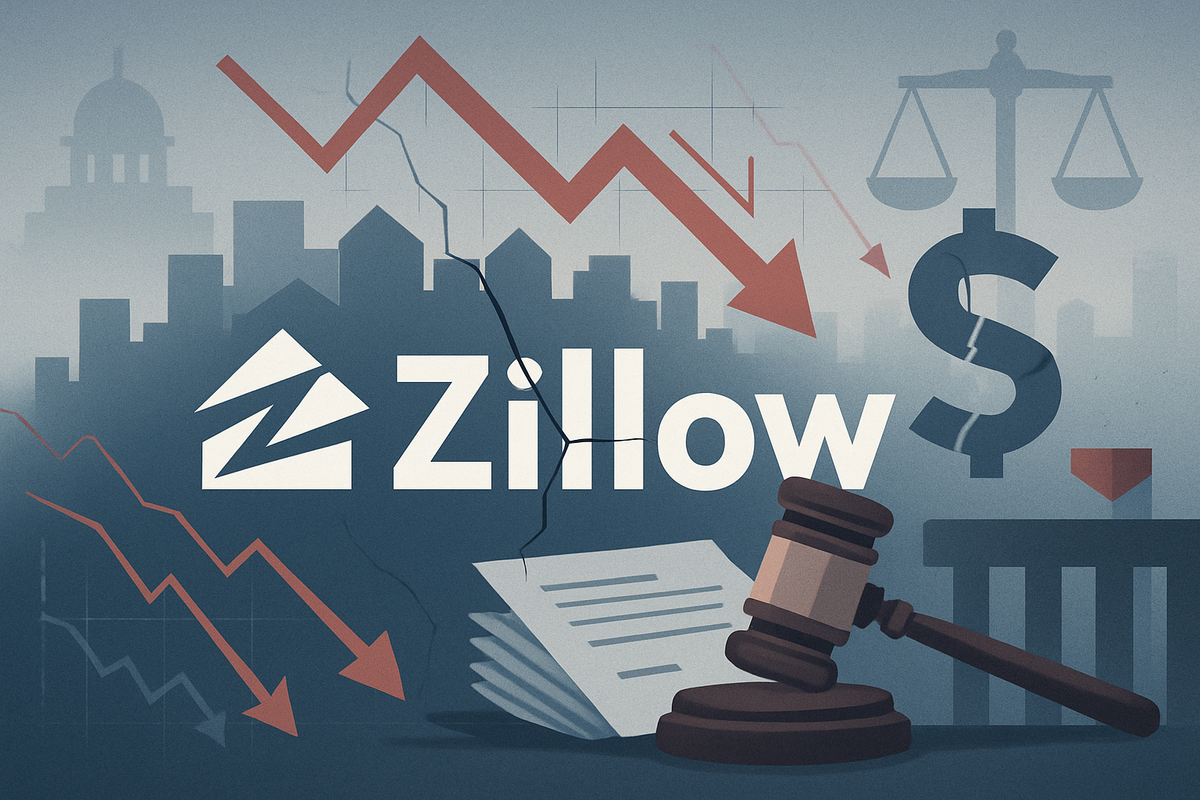
Zillow Group (NASDAQ: Z), the ubiquitous online real estate giant, finds its stock facing significant pressure today following the Federal Trade Commission's (FTC) announcement of an antitrust lawsuit. Filed on September 30, 2025, the lawsuit alleges that Zillow engaged in an unlawful agreement with competitor Redfin (NASDAQ: RDFN) to suppress competition in the lucrative online rental advertising market. This legal challenge casts a shadow over Zillow's otherwise strong financial performance, which has seen the company on track for its first profitable year since 2012.
The core of the FTC's complaint revolves around a February 2025 deal where Zillow allegedly paid Redfin $100 million and other compensation to exit the internet listing services (ILS) advertising market for multifamily rental properties. This move, according to regulators, effectively eliminated a key competitor and consolidated Zillow's already dominant position. The market's immediate reaction was sharp, with Zillow's shares dropping nearly 8% on the day of the announcement, signaling investor concern about potential remedies and the broader implications for the company's growth strategy.
Regulatory Scrutiny Intensifies Over Zillow-Redfin Partnership
The lawsuit filed by the FTC on September 30, 2025, in the U.S. District Court for the Eastern District of Virginia, targets a strategic partnership between Zillow (NASDAQ: Z) and Redfin (NASDAQ: RDFN) that regulators contend is overtly anti-competitive. The central allegation is that Zillow paid Redfin a substantial sum, along with other considerations, to cease competing in the online advertising market for multifamily rental properties. This arrangement allegedly included Redfin ending its contracts with advertising customers in this segment, assisting Zillow in acquiring that business, and agreeing to a non-compete clause for up to nine years. Furthermore, Redfin's websites were to become exclusive syndicators of Zillow's listings, effectively mirroring Zillow's rental offerings.
The timeline of events highlights the swift regulatory response. The FTC's initial filing on September 30 was quickly followed by similar antitrust lawsuits from attorneys general in five states—Virginia, Arizona, Connecticut, New York, and Washington—on October 1, 2025. However, the legal proceedings have hit a temporary snag; as of October 6, 2025, the lawsuit has been paused or stayed due to the ongoing federal government shutdown. This temporary halt, granted by Judge Anthony Trenga, means the case will remain on hold until federal operations resume, after which new deadlines will be set.
Key players involved in this high-stakes legal drama include the Federal Trade Commission, acting as the primary plaintiff against Zillow and Redfin. The state attorneys general represent additional governmental pressure. Zillow, for its part, has vehemently defended the partnership, asserting it is "pro-competitive and pro-consumer." A spokesperson for the company stated that the agreement benefits both renters by expanding access to listings and property managers by connecting them with high-intent renters. Redfin has echoed this sentiment, expressing strong disagreement with the FTC's allegations and citing its inability to justify the cost of maintaining its rentals sales force by the end of 2024.
Initial market reactions underscored the gravity of the allegations. Zillow Group's stock (NASDAQ: ZG) saw an almost 8% decline on September 30, the day the lawsuit was announced. Redfin's shares also experienced a drop of approximately 5%. The broader market sentiment has seen Zillow's stock fall about 20% from its 52-week high in early September, reflecting investor anxiety over potential remedies such as divestitures or the unwinding of the agreement. Despite this, some analysts have maintained "Buy" ratings, viewing the recent share price weakness as an "attractive entry point," suggesting a potential overreaction by the market.
Market Dynamics: Winners, Losers, and Zillow's Profitability at Stake
The FTC's antitrust lawsuit against Zillow (NASDAQ: Z) and Redfin (NASDAQ: RDFN) has immediately reshaped the competitive landscape of the online rental advertising market, creating potential winners and losers. The most evident losers are Zillow and Redfin themselves. Both companies face substantial legal costs, potential fines, and the risk of having their partnership unwound, which could significantly impact their revenue streams. Zillow's multifamily rentals business is a fast-growing segment, generating about $200 million in revenue in the first half of 2025 and accounting for 16% of the company's total revenue. The Redfin partnership alone was projected to contribute approximately $100 million in annualized revenue from transferred customers and was expected to drive about 44% of Zillow's total consolidated revenue growth in 2026. Should this deal be dismantled, Zillow's ambitious growth targets and its recent return to profitability could be severely hampered.
Redfin (NASDAQ: RDFN) also stands to lose, particularly given its justification for the partnership was the inability to sustain its rental sales force. An unwinding of the deal would leave Redfin without the financial benefits of the agreement and potentially facing renewed pressure to compete in a market it sought to exit. The lawsuit also brings reputational damage to both companies, as it frames their collaboration as anti-competitive rather than pro-consumer.
Conversely, other players in the online real estate and rental advertising space could emerge as winners. Competitors like CoStar Group (NASDAQ: CSGP), which operates Apartments.com and other commercial real estate platforms, could benefit from increased market competition and potentially gain market share if Zillow's dominance is challenged. If the lawsuit leads to a more open and competitive environment, property managers could see lower advertising costs and more innovative listing services, which would ultimately benefit consumers through better access to rental listings and potentially more competitive rental prices. The lawsuit underscores the FTC's commitment to fostering competition, which could pave the way for smaller, innovative platforms to gain traction. Zillow's recent profitability, driven by its mortgage business and efficient headcount management, is a critical backdrop to this legal challenge. The company reported a rise in Q2 2025 revenue to $641 million and a return to modest profitability, leading to an uplift in its full-year revenue growth guidance. This lawsuit directly targets a key growth engine within that profitable outlook, making the outcome crucial for Zillow's sustained financial health.
Broader Implications: A Bellwether for Digital Market Regulation
The FTC's antitrust lawsuit against Zillow (NASDAQ: Z) is more than just a challenge to a single business deal; it represents a significant development in the broader trend of increased regulatory scrutiny over large technology companies and digital marketplaces. This event fits squarely into a global movement to curb potential monopolistic practices in the digital economy, where platforms often achieve dominant positions that can stifle competition and innovation. The case serves as a bellwether, signaling that even established players in niche digital markets like real estate are not immune to antitrust enforcement.
The potential ripple effects extend beyond Zillow and Redfin (NASDAQ: RDFN). Competitors in the online real estate sector, such as CoStar Group (NASDAQ: CSGP), will be closely watching the proceedings. A successful FTC challenge could embolden regulators to investigate other large platforms or strategic partnerships that appear to limit competition. It could also influence how real estate technology companies structure their acquisitions and collaborations going forward, pushing them towards more transparent and demonstrably pro-competitive arrangements. Partners of Zillow, including real estate agents and brokerages who rely on its platform for leads and advertising, might also face uncertainty regarding the future stability and competitive dynamics of their primary online channel.
From a regulatory and policy perspective, this lawsuit reinforces the FTC's aggressive stance under its current leadership, emphasizing the use of antitrust laws to protect competition in digital markets. It could set a precedent for how future agreements between dominant online platforms and their competitors are evaluated, particularly those involving payments for market exit or exclusive syndication. Historically, antitrust cases against tech giants have often focused on consumer harm through price manipulation or reduced choice. This case, however, also emphasizes harm to business customers (property managers) through potentially higher advertising costs and reduced innovation in listing services. Comparisons can be drawn to past antitrust actions against other large digital platforms, such as those in the search engine or social media sectors, where concerns about market dominance and anti-competitive behavior led to significant legal battles and, in some cases, substantial penalties or structural changes. The Zillow case highlights that the real estate tech sector is now firmly within the crosshairs of this broader regulatory trend.
Navigating the Future: Potential Scenarios and Investor Watchpoints
The immediate future for Zillow (NASDAQ: Z) and Redfin (NASDAQ: RDFN) hinges on the resolution of the federal government shutdown, which has temporarily halted the FTC's lawsuit. Once the stay is lifted, the legal battle will resume, and the companies will face a protracted period of litigation. In the short term, both Zillow and Redfin will incur significant legal expenses, and the ongoing uncertainty could weigh on their stock performance. The long-term possibilities are varied and could range from a settlement, where Zillow and Redfin agree to modify or unwind their partnership, to a full trial with potential court-ordered remedies. These remedies could include hefty fines, mandatory divestitures, or a permanent injunction against similar anti-competitive agreements.
For Zillow, a strategic pivot may be necessary if the lawsuit severely impacts its multifamily rental business. The company might need to intensify its focus on other profitable segments, such as its mortgage business or single-family rental offerings, to offset any revenue loss. It could also explore alternative, demonstrably pro-competitive growth strategies or partnerships. The outcome of this case will undoubtedly shape how Zillow approaches market expansion and competitor engagement in the future, potentially leading to more cautious and transparent deal-making. Market opportunities might emerge for smaller, independent rental listing platforms or new entrants if Zillow's market power is curtailed, fostering a more diverse and competitive environment. Conversely, the challenge for Zillow will be to maintain its market leadership and growth trajectory while navigating this complex legal and regulatory landscape.
Investors should closely watch several key indicators in the coming months. First, any updates on the federal government shutdown and the resumption of the lawsuit will be critical. Second, Zillow's quarterly earnings reports will provide insight into how the company is managing its expenses and if it's adjusting its revenue guidance in light of the legal challenge. Third, any statements or filings from the FTC or the state attorneys general could signal the direction and intensity of the prosecution. Lastly, the performance of Zillow's competitors, particularly in the rental advertising space, could indicate shifts in market dynamics. The resolution of this lawsuit will not only determine the fate of a significant partnership but also set a precedent for antitrust enforcement in the rapidly evolving digital real estate market.
Wrap-Up: Zillow's Crossroads Amidst Regulatory Headwinds
The FTC's antitrust lawsuit against Zillow (NASDAQ: Z) marks a pivotal moment for the online real estate giant, casting a long shadow over its recent return to profitability and ambitious growth plans. The core takeaway is that even as Zillow has achieved financial stability, its dominant position in key digital markets is attracting intense regulatory scrutiny. The allegations of an anti-competitive agreement with Redfin (NASDAQ: RDFN) highlight a broader trend of governments actively challenging perceived monopolistic practices in the tech sector, signaling that market leadership alone is no longer a shield against legal challenges.
Moving forward, the market will be closely assessing Zillow's resilience and strategic agility. While the company's financial health, characterized by strong cash reserves and a favorable current ratio, provides some buffer, the potential unwinding of the Redfin partnership and the associated revenue loss from its rapidly growing multifamily rental segment pose a significant challenge. The outcome of this lawsuit will not only impact Zillow's bottom line but could also redefine the competitive landscape of the online real estate market, potentially creating opportunities for other players like CoStar Group (NASDAQ: CSGP) and fostering greater innovation.
Investors should remain vigilant, focusing on how Zillow adapts its business strategy, manages legal costs, and communicates its future growth trajectory. Key watchpoints include the progression of the lawsuit post-government shutdown, any revised financial guidance from Zillow, and the broader regulatory environment for digital platforms. The Zillow case is a potent reminder that in today's financial markets, legal and regulatory risks are as crucial as operational performance, and companies with significant market power must operate with an acute awareness of antitrust compliance. The lasting impact of this event will be a testament to Zillow's ability to navigate complex legal battles while sustaining its innovation and market leadership.





